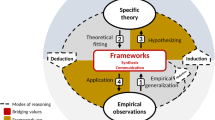Abstract
The wuli, shili, renli (WSR) systems methodology (an oriental systems approach to the dynamic unification of the study of the objective world, organization, and human factors during intervention) is discussed. After a brief description of WSR, the paper concentrates on its application to the development of a computer-supported water resources management system. The working process of the WSR approach is illustrated through this case study. Also, the "added value" of WSR is made clear: in contrast with other Chinese methodologies which might be applied to handle a "technical" project of this nature, WSR makes the need to deal with human relations more visible. It therefore embodies the insight, common to Western systems methodologies, that human relations are integral to the success of interventions—but in a manner that is both philosophically and practically meaningful to a Chinese audience.
Similar content being viewed by others
References
Checkland, P. B. (1981). Systems Thinking, Systems Practice, John Wiley & Sons.
Gu, J. F., et al. (1993). A set of models on reservoir operations, supply and allocation for Qinhuangdao water resources system. In Zheng, W. M. (ed.), Systems Science and Systems Engineering (ICSSSE'93), International Academic, pp. 947–950.
Gu, J., and Zhu, Z. (2000). Knowing wuli, sensing shili, caring for renli: Methodology of the WSR approach. Syst. Pract. Act. Res. 13, 11–20.
Liu, C. F., Zhang, J. G., and Tao, X. Y. (1993). A large scale system project of urban water conservancy automation. In, Systems Science and Systems Engineering (ICSSSE'93), (Zheng, W. M. ed.), International Academic, pp. 968–971.
Midgley, G., and Wilby, J. (2000). Systems practice in China: New developments and cross-cultural collaborations. Syst. Pract. Act. Res. 13, 3–9.
Pressman, T. E. (1992). A synthesis of system inquiry and the eastern mode of inquiry. Syst. Res. 9(3), 47–63.
Qian, X. S., Yu, J. Y., and Dai, R. W. (1993). A new discipline of science—The study of open complex giant system and its methodology. Chinese J. Syst. Eng. Electronics 4(2), 2–12.
Sawaragi, Y., Nakayama, H., and Nakamori, Y. (1988). An Introduction to a New System Engineering Approach—Shinayaka System Approach, OHM Press, Tokyo.
Tang, X. J. (1995). Soft System Approach to Computerized Decision Support for Water Resources Management, Ph.D. dissertation, Institute of Systems Science, Chinese Academy of Sciences, Beijing.
Tang, X. J., and Gu., J. F. (1993a). The Estimation of Parameters of Pearson Type III Type Distribution and Probability Forecast, Technical Report No. OOAFM-03, Institute of Systems Science, Chinese Academy of Sciences, Beijing (in Chinese).
Tang, X. J., and Gu., J. F. (1993b). The development and system design of decision support system in view of coordination. J. Decision Making Decision Support Syst. 3(4), 30–38 (in Chinese).
Tang, X. J., et al. (1994). Further Explanation of the Estimation of Parameters of Pearson Type III Distribution and its Application, Technical Report No. OOAFM-06, Institute of Systems Science, Chinese Academy of Sciences, Beijing (in Chinese).
Zhang, Y. G., et al. (1993), A distributed decision support system (DDSS) for management of water resource. In Zheng, M. M. (ed.), Systems Science and Systems Engineering (ICSSSE'93), International Academic, pp. 433–436.
Zhu, Z. (2000). Dealing with a differentiated whole: The philosophy of the WSR approach. Syst. Pract. Act. Res. 13, 21–57.
Author information
Authors and Affiliations
Rights and permissions
About this article
Cite this article
Gu, J., Tang, X. Designing a Water Resources Management Decision Support System: An Application of the WSR Approach. Systemic Practice and Action Research 13, 59–70 (2000). https://doi.org/10.1023/A:1009571522164
Issue Date:
DOI: https://doi.org/10.1023/A:1009571522164




